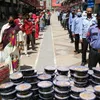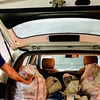Helping people live with dignity: Meet Anoop Khanna, a social worker striving for a better India
Anoop Khanna, a resident and social worker in Noida, is helping people live with dignity by providing food, clothes, and medicines at a very minimal cost through his social initiatives.
Every day, in Noida Sector 29, almost 500 people from different social sectors queue up outside a store to grab a full meal for just Rs 5.
Dadi ki Rasoi (grandmother’s kitchen), an initiative by Anoop Khanna, provides quality meals for this minimal amount. The 62-year-old social worker believes that every human has the right to food, clothing and medicines — with dignity.

Anoop Khanna finds a huge queue outside his stall every day
“My motto in life is quite simple – small steps bring big changes. From education to sports to the welfare of the common, I have worked in my full individual capacity to help my fellow citizens by taking one step at a time,” Anoop tells SocialStory.
A sportsman’s spirit
Born in Moradabad, a small town in Uttar Pradesh, Anoop Khanna is full of the sportsman’s spirit that he inculcated in his school and college days. He encourages the youth to participate in the field of karate, badminton, and athletic games, and is also actively involved in the development of sports facilities in Noida.

Anoop has been a passionate sports enthusiast
Since 1984, Anoop has been running two pharmacies across Noida. But, the businessman also acts as a pillar of support for the members of his community.
“My father, who was active during Independence Movement and worked alongside freedom fighters like Mahatma Gandhi and Muhammad Ali Jinnah, always inspired me to work for the welfare of the nation,” says Anoop.
Dadi Ki Rasoi
“The basic requirement for any person is food, clothes, and medicines, and my aim is to make these three things accessible to the poorest of people — with dignity,” says Anoop.
To make good on this aim, on August 21, 2015, he launched Dadi ki Rasoi to provide meals for just Rs 5.
The food is cooked in desi ghee. The menu ranges from dal chawal, black chickpeas to other vegetables so that people can have some variety as well. He claims that the food is prepared with utmost hygiene, monitored by him and four CCTV cameras in the kitchen.

Based on contributions, they also distribute biscuits and snacks, again at Rs 5.
In addition to the meals, it also includes packets of biscuits, juice packs, and sometimes, even sweets like rasgullas, based on the contribution the stall receives every day, sold again at just Rs 5 per item.
Serving labourers, daily wagers, students, and private employees, Dadi ki Rasoi has two stalls operating in Noida.
But why not just give it for free to the needy?
To that, Anoop says, “To respect the dignity and not treat poor as beggars, I decided to take a nominal amount of Rs 5 and not give food for free.”
Anoop is able to manage the costs with the support of his two children, who are settled abroad.
An empathy store
Anoop also runs a Sadbhavana Store (empathy store), where the needy can get clothes for a price of Rs 10.
“All of us discard clothes, shoes, books, and many items which can be useful to others. At this store, the poor can walk in and shop like any other individual. Inspired by my small effort, now many people have come forward in this initiative and extended their support,” says Anoop.

People can pick up any clothes they like at the 'Sadbhavana Store' at just Rs 10
People can also borrow special outfits like ghagras and suits (based on the availability). Instead of paying for the clothes, all they have to do is dry clean the outfits and return them.
Initially, everything was taken care of by Anoop, but he has now employed people to take care of both initiatives. Despite being non-profit, he ensures that he pays those who work with him.
Suraj Kumar has been associated with Anoop or Uncle ji, as he calls him, for quite some time now. He says, “ I do most of the work at Dadi ki Rasoi and the medical store, especially if Uncle ji is unavailable. I am most happy to be associated with a social worker like him.”
Anoop was recently commended by the Sanjay Kothari, Secretary to the President of India, for his efforts, and was invited to share his experiences with President Ram Nath Kovind on January 3, 2020.
Fighting injustices and championing for the better
For over 25 years, Anoop has been helping people through several social movements and hopes to see India in a better state, with improved infrastructure and sanitation, starting with Noida.
Renowned for his passion for social reform, Anoop has been championing the cause of education for all and has also campaigned against the capricious school fee hike in Noida.
“It was in under our banner that a massive agitation was started against the exorbitant fee hike in private schools, which is now spread across the nation. We fought the battle on roads and even legally took up the case,” he says.

Anoop Khanna with President Ram Nath Kovind
Anoop also helps provide quality education to underprivileged children and is a patron to a school for children with intellectual disabilities.
He has initiated cancer awareness and anti-tobacco campaigns, led anti-polythene crusades, and led a No Fuel Day drive to create awareness about energy conservation.
Anoop was an active participant of Anna Hazare’s non-violent protest against corruption. He sat down for a fast for about 12 days in Noida, supporting the movement. In order to encourage the voting population, he even offered a discount at his chemist shop to all the voters.
He says, “Recently, I also enrolled with ‘Pradhan Mantri Jan Aushadhi Yojna’ (people's pharmaceutical campaign), and opened first ‘Pradhan Mantri Jan Aushadhi Kendra’ (people's medical store) in Noida to ensure quality medicines at affordable prices.”
The COVID-19 challenge and the way forward
The pandemic disrupted many food joints, including Dadi ki Rasoi. But seeing vulnerable sections — vendors, daily wagers, construction workers — face severe economic distress, the team decided to do something.
“We distributed packets of dal, atta, rice to needy families and migrant labourers who were seen walking on roads, and also went to locations where people needed help,” says Anoop.
The social worker believes in the democratic principle of a ‘people’s government’ and is striving to put people in the centre of governance. Anoop has also taken steps to mobilise the youth and making them actively participate in the betterment of society.
He is appointing advisers to bridge the gap between the suggestions from citizens and the local government’s actions. These advisers regularly meet and participate in governance activities.
Every big change can happen with a few small steps, he adds. “Be it providing one extra meal to the poor man on the street or giving away one pair of clothes that doesn’t fit you anymore or calling out one wrong deed that does more harm than good — taking that one actionable step can go much farther than just words,” concludes Anoop.
Edited by Saheli Sen Gupta










